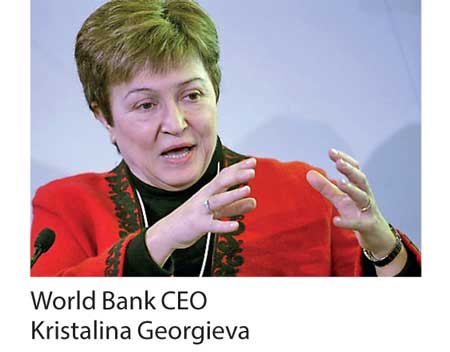Monday Feb 23, 2026
Monday Feb 23, 2026
Friday, 21 April 2017 00:00 - - {{hitsCtrl.values.hits}}
 Reuters: The Trump administration would be working against its “America First” agenda if it were to diminish the United States’ leadership role in multilateral institutions including the World Bank, the lender’s second-ranking executive said on Wednesday.
Reuters: The Trump administration would be working against its “America First” agenda if it were to diminish the United States’ leadership role in multilateral institutions including the World Bank, the lender’s second-ranking executive said on Wednesday.
Kristalina Georgieva, the World Bank Group’s new chief executive, said that so far, her meetings with Trump administration officials have not revealed a desire to step back from multilateral institutions.
“I haven’t heard from them saying, ‘Oh, we want to disengage,’” Georgieva told a forum at the start of the International Monetary Fund and World Bank spring meetings in Washington.
The Trump administration’s so-called “skinny budget” proposal had envisioned a $650 million cut to funding for multilateral development banks including the World Bank over three years, compared to commitments made by the Obama administration.
But it is the US Congress, not the White House, that will ultimately decide spending levels for the fiscal year ended Oct. 1, 2018.
Georgieva said the budget did show, however, that the administration values its place in the institutions. The United States is by far the World Bank’s largest shareholder, with about 17 percent of its voting power.
“It’s not so much aligned with ‘America First’ for you to ignore your place in institutions where you are a very important, prominent voice,” she told a meeting of the Bretton Woods Committee.
She added that the financing of the World Bank is likely “not top of mind” amid the many priorities of the new administration, and emphasised that the bank is self-funding in many respects.
“We are a bank. You put money in, you get money out,” she said, adding that shareholders have only paid in about $15 billion in capital since the World Bank’s founding 70 years ago, while over $700 billion in loans have been made and paid back with interest.
“We are a very good value-for-money place,” said Georgieva, a Bulgarian national who joined the World Bank in January after several years working at the European Commission.
She said another reason that she believes President Donald Trump’s administration will want to maintain its role in the bank is its work in stabilising war-torn areas where there are US interests.
“We are in Iraq. We are in Afghanistan. Hopefully, we would be in Syria one day, places that require investments in stabilisation. I don’t see how that would be bad for any of our shareholders to have a more stable world,” she said.